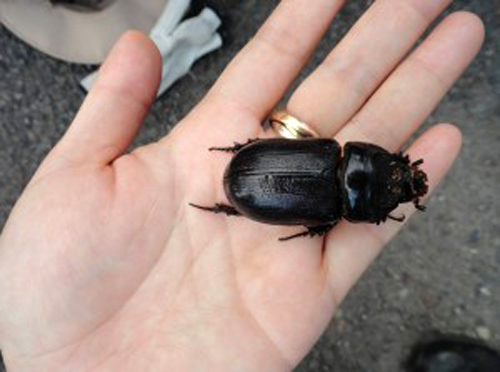Navy Seabees combating invasive coconut rhinoceros beetles at Pearl Harbor

A man held a coconut rhinoceros beetle. A number of the bugs were caught at Joint Base Pearl Harbor-Hickam on Dec. 23, 2013 during routine surveys.
Navy Seabees have been called in to combat a growing number of invasive coconut rhinoceros beetles discovered on Joint Base Pearl Harbor-Hickam, the Navy said Thursday.
A total of 119 of the big beetles in adult form have been caught near Mamala Bay Golf Course and beach at Hickam, along with more than 250 larvae and 16 pupae.
On Jan. 9, the state Department of Agriculture said nine adult beetles had been trapped.
The beetles, which were discovered at the joint base on Dec. 23 during routine surveys, are a major pest of palms in India, the Philippines, the Palaus, Fiji, American and Western Samoa, Guam, and other locations.
They damage palms by boring into the center of the crown, cutting through leaves and leaving V-shaped cuts in the fronds and holes in the palms.
Navy Construction Battalion Maintenance Unit 303 (Seabees) helped to produce more than 300 traps that have been deployed in a two-mile radius.
Don't miss out on what's happening!
Stay in touch with breaking news, as it happens, conveniently in your email inbox. It's FREE!
The Navy said it is unknown how the coconut rhinoceros beetle arrived at the joint base, but it is possible the pest could have come on either military or civilian flights from many possible locations.
"Joint Base Pearl Harbor-Hickam has the nearest green space to the shared runway and airfields of Honolulu International Airport and Hickam, so it is likely that invasive species could appear there first," the Navy said.
In early November inspectors at Honolulu airport picked up a coconut rhinoceros beetle in luggage from a flight arriving from Japan, the Navy said.
Residents are advised to report beetles on the state pest hotline, 643-7378 (643-PEST).



